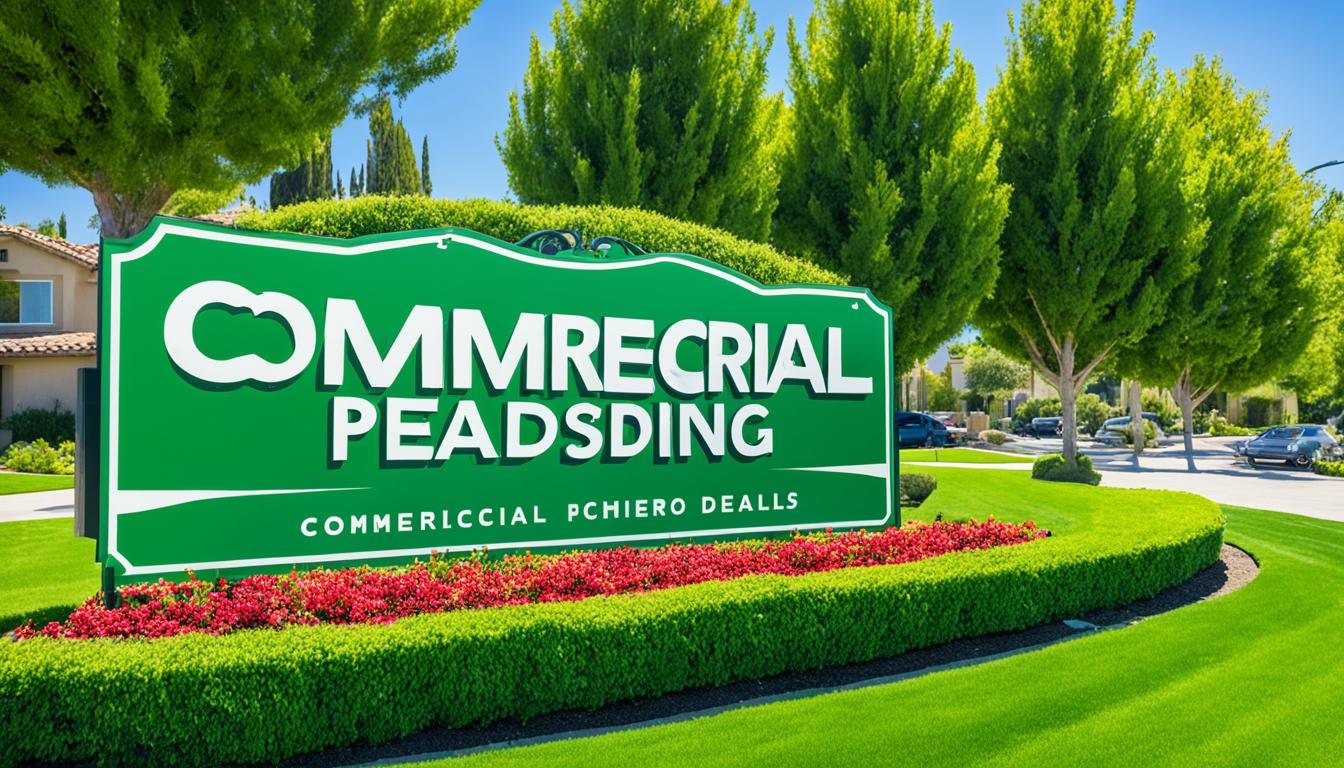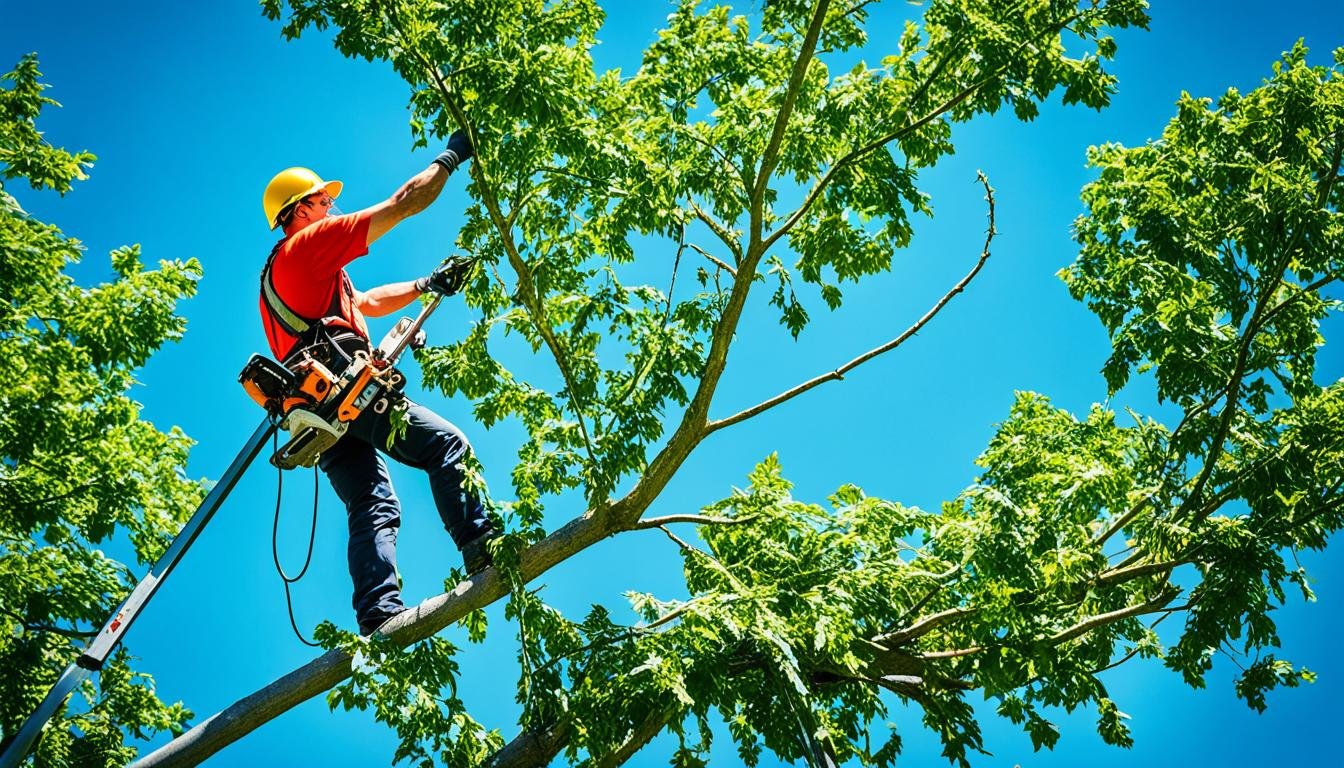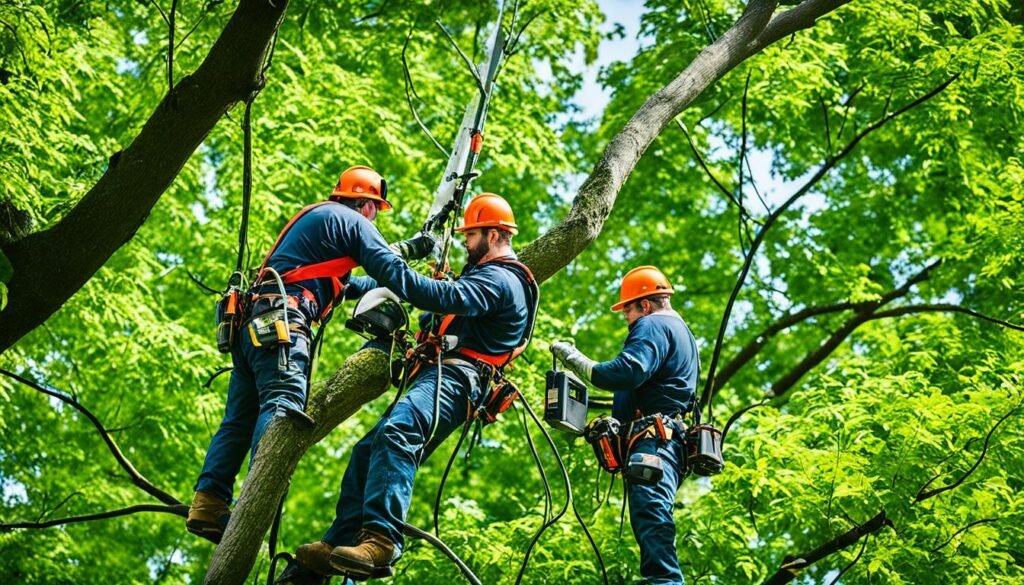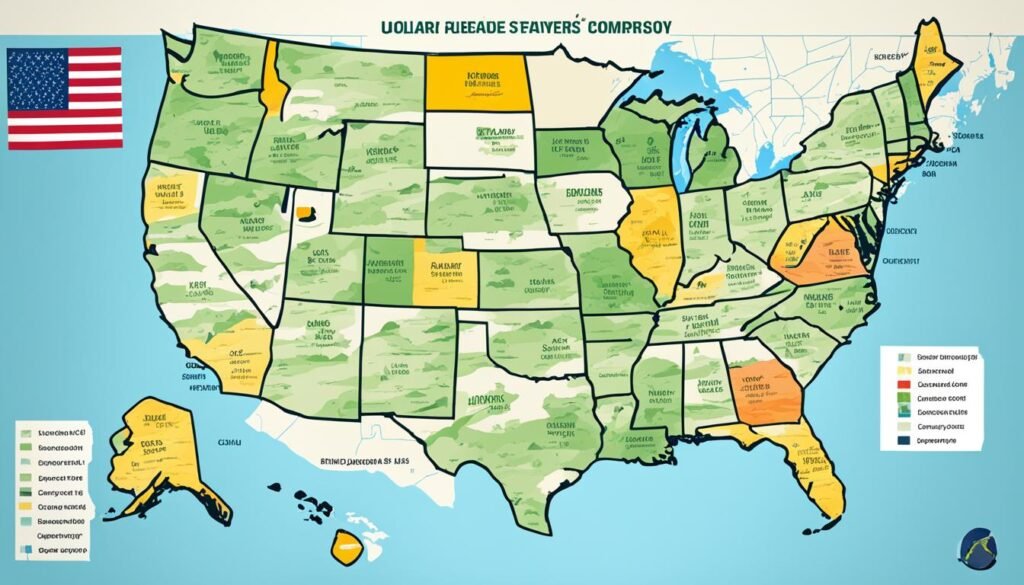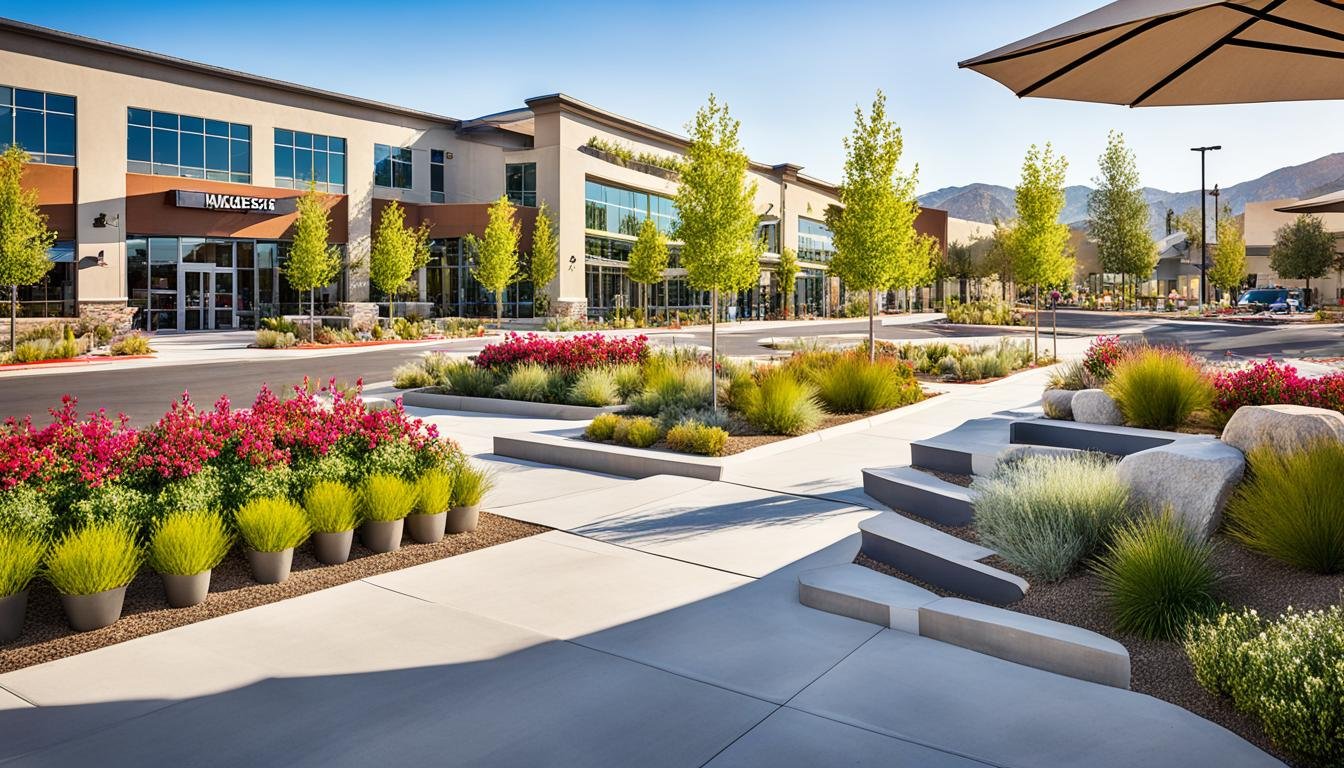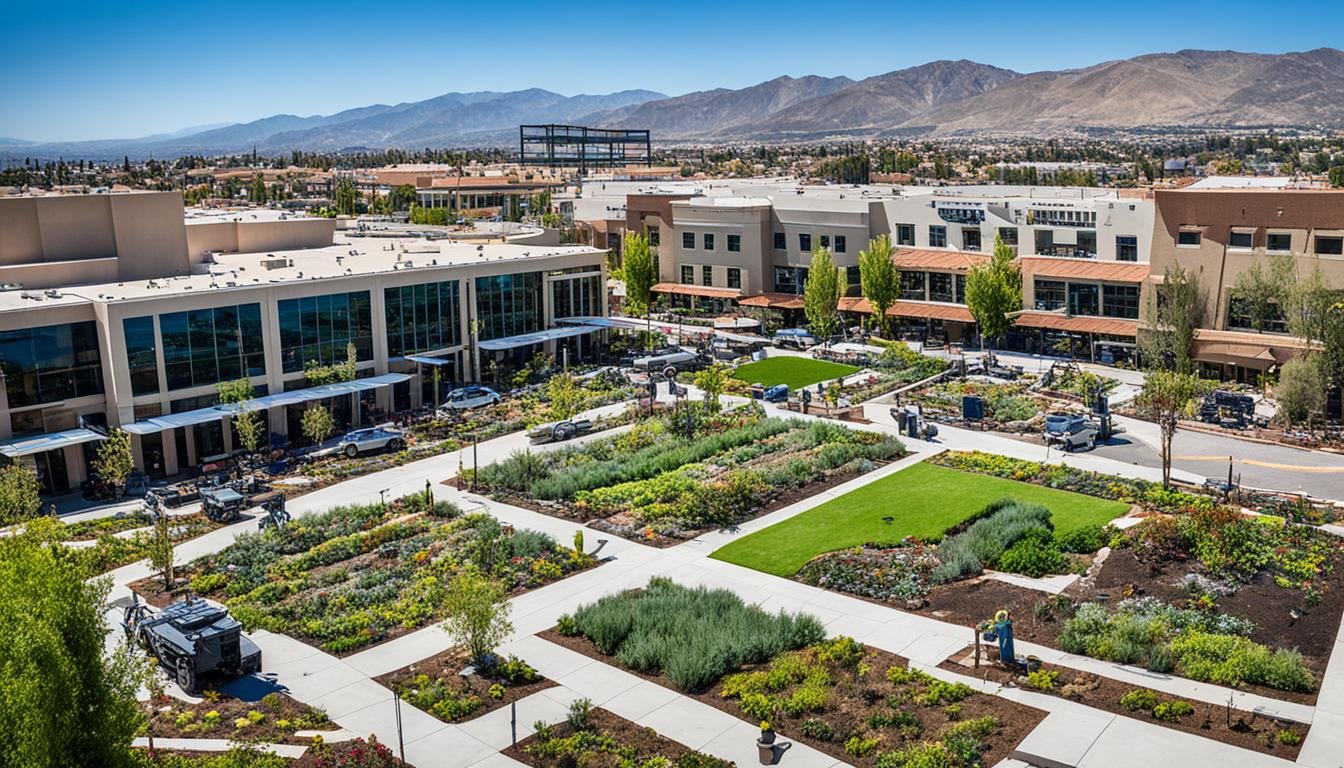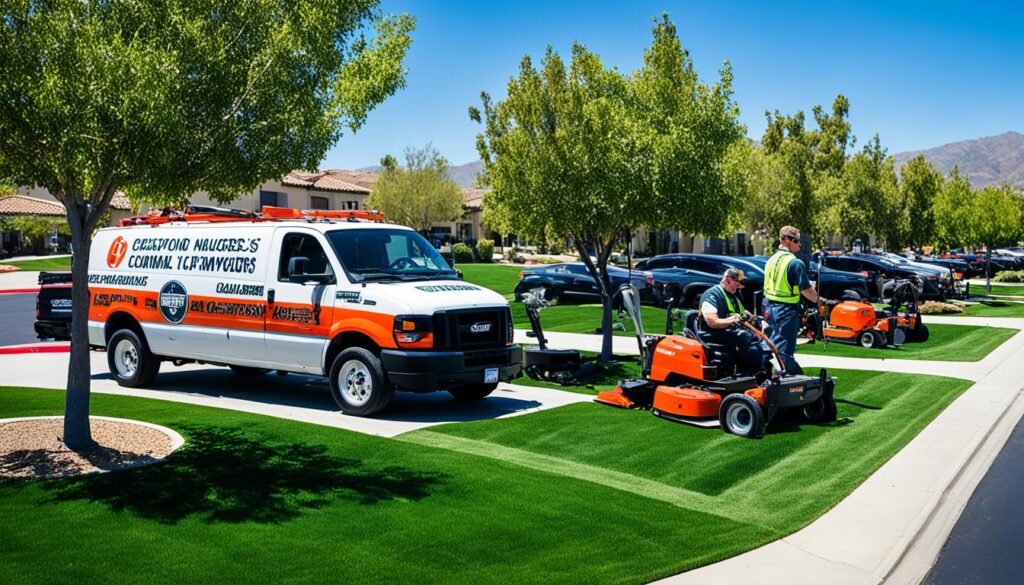A healthy, green lawn does more than just beautify your home; it also boosts your home’s value. Did you know that according to research by the Lawn Care Institute, turf grass alone can increase a home’s value by as much as 15%? That’s a significant impact on your property’s worth, simply by having a well-maintained lawn.
Proper lawn care, including regular fertilization, watering, mowing, and weed control, is one of the most cost-effective ways to increase home value. In fact, simple lawn maintenance typically results in a return on investment of 100% to 200% for home sellers. By investing in your lawn, you can reap the benefits when it comes time to sell your home.
In addition to lush grass, other landscaping projects can also add value to your home. From outdoor lighting to trees and shrubs, a well-maintained front garden can enhance curb appeal and make a lasting impression on potential buyers.
Key Takeaways:
- A healthy, green lawn can increase a home’s value by up to 15%.
- Proper lawn care and maintenance provide a high return on investment.
- Other landscaping projects, such as outdoor lighting and trees, can enhance curb appeal.
- Investing in practical and visually appealing landscaping can enhance both the aesthetics and market worth of your home.
- Approach landscaping projects with caution and avoid high-maintenance or niche designs that may not appeal to potential buyers.
The Importance of Curb Appeal and Grass Value
Curb appeal plays a significant role in impressing potential buyers and increasing the market value of residential homes. One crucial element of curb appeal is the quality and appearance of the grass and landscaping. A well-maintained property with lush greenery may be worth 5.5% to 12.7% more than a similar home with minimal landscaping.
A visually appealing lawn and exterior create the impression that the property has been well-cared for, enhancing its overall appeal. According to a study conducted by horticulturist Alex X. Niemiera at Virginia Tech, a well-landscaped home had an advantage of 5.5% to 12.7% over a home with no landscaping. For a $300,000 home, this translates to an additional value of $16,500 to $38,100.
| Benefits of Curb Appeal and Grass Value | Residential Lawn and Home Market Value | Greenery and Property Worth |
|---|---|---|
| Increases property value | Enhances marketability | Creates a positive first impression |
| Attracts potential buyers | Improves neighborhood aesthetics | Provides outdoor living space |
| Reduced time on the market | Higher selling price | Enhances overall home value |
Investing in your lawn and landscaping not only adds beauty to your home but also has a direct impact on its value. By prioritizing curb appeal and maintaining a healthy, visually appealing lawn, you can maximize your property’s worth in the residential real estate market.
The Best Landscaping Projects to Increase Home Value
To maximize the value of your home, consider incorporating these landscaping projects alongside maintaining a healthy lawn:
- Adding Grass for Home Resale Value: A lush, well-maintained lawn is essential for boosting curb appeal and increasing property value. Consider overseeding bare patches and keeping your grass well-watered and fertilized to create a vibrant and inviting outdoor space.
- Outdoor Lighting: Enhance the visual appeal of your home and increase safety with outdoor lighting. Installing landscape lighting fixtures can highlight architectural features, illuminate walkways, and create a warm and welcoming ambiance for potential buyers.
- Trees and Shrubs: Planting mature trees and shrubs not only adds beauty to your property but also provides shade and privacy. These landscaping elements can create an inviting atmosphere and may even help reduce energy costs by providing natural cooling and insulation.
- Front Garden: A well-designed and well-maintained front garden can significantly enhance your home’s curb appeal. Incorporate colorful flowers and plants, strategically placed decorative elements, and defined walkways to create an attractive, welcoming entrance that entices potential buyers.
- Mosquito Control: Investing in mosquito control measures can make your outdoor space more enjoyable and appealing. Consider installing mosquito-repellent plants, such as citronella and lavender, or implementing a mosquito misting system to create a mosquito-free environment.
By prioritizing these landscaping projects, you can elevate the overall aesthetics of your property and potentially attract higher offers from prospective buyers.

Landscaping Projects to Avoid or Approach with Caution
Swimming Pools
If you’re considering installing a swimming pool in your backyard with the hope of increasing your home’s value, think twice. While a swimming pool may seem attractive, it can be a costly investment that doesn’t always yield a high return. Not only are pools expensive to build and maintain, but they also require ongoing upkeep, such as cleaning, chemical treatments, and repairs. Additionally, some potential buyers may view a swimming pool as a safety concern, especially for families with small children.

Ponds and Water Features
Ponds and water features can add a serene and peaceful ambiance to your outdoor space. However, they can also be high-maintenance and may not appeal to all potential buyers. These features require regular cleaning and maintenance to prevent issues such as algae growth and pump failures. Moreover, ponds and water features may not suit every homeowner’s lifestyle or aesthetic preferences, making them a risky investment when it comes to increasing property value.
High-Maintenance Landscaping
While complex and intricate gardens can be visually stunning, they often require significant time and effort to maintain. Not everyone has the resources or desire to invest in high-maintenance landscaping, which includes frequent pruning, weeding, and irrigation. Additionally, potential buyers may be deterred by the thought of the ongoing upkeep required for intricate gardens, as they may view them as a burden rather than a desirable feature.
Complex Gardens
While a carefully designed and thought-out garden can enhance the aesthetics of your home, be cautious not to create a garden that is too complex or overwhelming. Gardens with a vast array of plants, intricate hardscaping, and unconventional design elements can potentially alienate buyers who prefer a more straightforward and manageable outdoor space. It’s essential to strike a balance between creating a visually appealing garden and ensuring it remains practical and low-maintenance for the average homeowner.
| Landscaping Projects to Avoid or Approach with Caution | Reasons to Consider |
|---|---|
| Swimming Pools | Expensive to build and maintain; safety concerns for families with children. |
| Ponds and Water Features | High-maintenance; may not appeal to all potential buyers. |
| High-Maintenance Landscaping | Requires significant time and effort to maintain; may be viewed as a burden by potential buyers. |
| Complex Gardens | Could potentially alienate buyers seeking a simpler and more manageable outdoor space. |
Conclusion
Landscaping, including a well-maintained lawn, can significantly increase the value of your home. Research conducted by the Lawn Care Institute indicates that a vibrant turf grass alone can add up to 15% to your home’s value. By focusing on projects that enhance curb appeal, such as outdoor lighting, the addition of trees and shrubs, and maintaining an attractive front garden, you have the potential to further boost your property’s worth.
However, it is essential to approach landscaping projects with caution. Avoid high-maintenance or niche designs that may not appeal to potential buyers. Opt instead for practical and visually appealing landscaping choices that will have a broad appeal. This will ensure that your investment not only enhances the aesthetics of your home but also contributes to its market value.
By implementing these landscaping strategies, you can create a welcoming and visually appealing exterior that leaves a lasting impression on potential buyers. A well-landscaped and cared-for property is more likely to generate higher offers and sell quickly in a competitive real estate market. So, take advantage of the power of landscaping to maximize your home’s value and position it as an attractive option for prospective buyers.
FAQ
Does having a healthy lawn increase home value?
Yes, research has shown that a healthy lawn can increase a home’s value by as much as 15%. Proper lawn care, including regular fertilization, watering, mowing, and weed control, is a cost-effective way to boost home value.
How does landscaping impact property value?
Landscaping, including a well-maintained lawn, can increase property value by 5.5% to 12.7%. A visually appealing exterior and curb appeal give the impression that the property has been well-maintained overall, which appeals to potential buyers.
What landscaping projects can increase home value?
In addition to maintaining a healthy lawn, other projects that can boost home value include outdoor lighting, planting trees and shrubs, and creating a well-maintained front garden.
Are there any landscaping projects to avoid or approach with caution?
Yes, swimming pools, ponds, and water features may not yield a high return on investment. High-maintenance or complex gardens may also deter potential buyers and decrease property value.
What is the conclusion on the impact of landscaping on property value?
Landscaping projects, especially a healthy lawn, can significantly increase the value of your home. Focusing on projects that enhance curb appeal and appeal to potential buyers can have a positive impact on property value.





